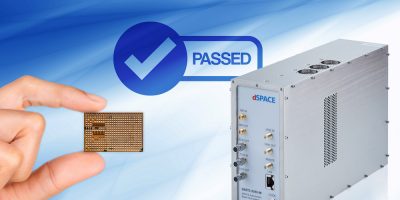dSpace and Uhnder collaborate to develop radar for autonomous vehicles
Radar systems for automated and autonomous driving will be developed jointly by Uhnder and dSpace to ensure they keep pace with safety requirements. Both companies will support each other in the development of sensors and validation solutions.
Radar sensors must detect their surroundings reliably and in great detail. For road use, it is important to implement measures that minimise interference and disturbance signals. Based in Austin, Texas, USA, Uhnder claims to offer the industry’s first digital automotive radar. Its radar on chip (RoC) uses a combination of CMOS and digital code modulation (DCM) technology. Its 4D digitally modulated radar chip integrates 192 virtual channels onto a single chip. Its high contrast resolution (HCR) provides range and angular resolution and makes it possible to separate small radar reflectors from proximate large reflectors.
Uhnder used dSpace automotive radar target simulators to subject sensors whose signals are processed using this modulation method to the most realistic tests possible ahead of approval for series production.
“Digitally modulated radar signals offer significant advantages in advanced driving assistance systems (ADAS) and autonomous driving applications,” said Ralf Reuter, senior director of customer and application engineering at Uhnder. “The radar test solutions from dSpace made it easy for us to investigate interferences between radar systems and to advance our systems as realistically as possible,” he added.
According to senior product manager, Dr Andreas Himmler from dSPACE: “The co-operation with Uhnder provides us with new requirements in sensor development . . . This gives us a headstart in the development of suitable concepts for . . . reliable validation. This applies particularly to the fulfillment of our customers’ challenging requirements with regard to radar target simulation.”
Uhnder believes its approach and technology will transform the automotive industry by changing the way radars work and significantly improving performance with the additional benefits of smaller size, lower power and lower cost.
dSpace develops and distributes integrated hardware and software tools for developing and testing electronic control units. Development areas include electro-mobility to vehicle networking and autonomous driving. Its customer base includes virtually all major vehicle manufacturers and suppliers, says the company. Its systems are also used in the aerospace and other industries. The company has headquarters in Paderborn, Germany and three project centres in Germany and serves customers through regional companies in the USA, the UK, France, Japan, China, and Croatia.




